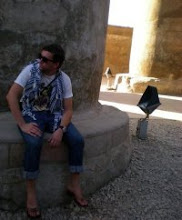




As I had promised back on Thursday, I would continue to share my experiences from my trip to Palestine last week, this time focusing exclusively on my observations from the West Bank. To offer a brief history lesson, the area referred to as the West Bank had been part of the Kingdom of Jordan following the collapse of the British Trans-Jordanian Mandate following the Second World War's conclusion in 1945. However, the Israeli victory in the Six-Day War of1967 with neighboring Arab nations led to the occupation of the West Bank of the Jordan River valley and has since become part of the state of Israel. What followed this event is nothing short of a humanitarian disaster, referred to by Palestinians as al-Naqba, or "the catastrophe." While the term had originated initially after the establishment of Israel in 1948 and the subsequent mass displacement of Palestinians, al-Naqba has also been used to the physical occupation of the West Bank region in 1967. Additionally, in more recent decades, Palestinians have suffered significant infringement upon basic human rights, such as freedom to move freely, maintain property, and protect themselves. In an effort to gain some semblance of self-government and diplomatic recognition within Israel and abroad, various political groups have sprung up in the Occupied Territories, including Hamas, Fatah, Jibha, and the Palestinian Authority (new version of the PLO). During my travels through the various Palestinian cities, like Ramallah and Bethlehem, I had an opportunity to speak with members of these organizations and ask about their goals/outlooks for the future. A salient trait I found was that Palestinians would like to see an end to the demeaning process of check-points and ID cards, which are used as tools of intimidation and oppression. For instance, imagine if everytime you wished to leave Ocean City or any town for that matter, you had to wait sometimes up to an hour to leave or came to the check-point to find that it had been closed for "security reasons." I believe that you would eventually feel a sense of utter hopelessness and perhaps, great animosity towards the soldier on the other side of that fence. While I do not deny that Israelis do have much to fear from their neighbors, particularly Iran and Syria, and this may warrant some of their strict security measures, but I ask how does oppressing millions of ordinary individuals create any true security? If anything, as the numerous suicide bombings in Israeli cities attest to, oppression only leads to further violence and hinders any peace efforts.
Moreover, the open defiance of Israeli settlers in close proximity to Palestinian communities, as in Hebron and Bethlehem, towards obeying their government's orders to cease expansion is another dimension of the conflict that I witnessed first hand. Just a few days before visiting the city of Hebron, which is considered holy by all 3 monotheistic religions for its relation to Abraham, the Israeli Defense Force (IDF) forcibly removed Jewish settlers from a house that they had seized illegally from Palestinians. Instances like this are fairly commonplace in the West Bank where settlers, through Israeli government loans and special programs, establish compounds sometimes right ontop of exisiting Palestinian communities. As my group toured Hebron with a local resident I could not help but notice that home's had had their windows broken and doors spray-painted with Stars of David. Making matters worse is that many of these settlers are now entering the ranks of the IDF and manning posts in their settlements. To make it clear, these settlers are, in my opinion, akin to any other religious extremist, whether it is an evangelical Christian detonating a bomb at an abortion clinic or a Muslim jihadist strapping on a dynamite belt to blow apart a bus. All of these individuals should be equally treated as terrorist and tried for disturbing the general peace. It is hard to argue otherwise when you meet Palestinian families that had their door kicked in the other night or had their relative's tombstone decicrated and broken.







